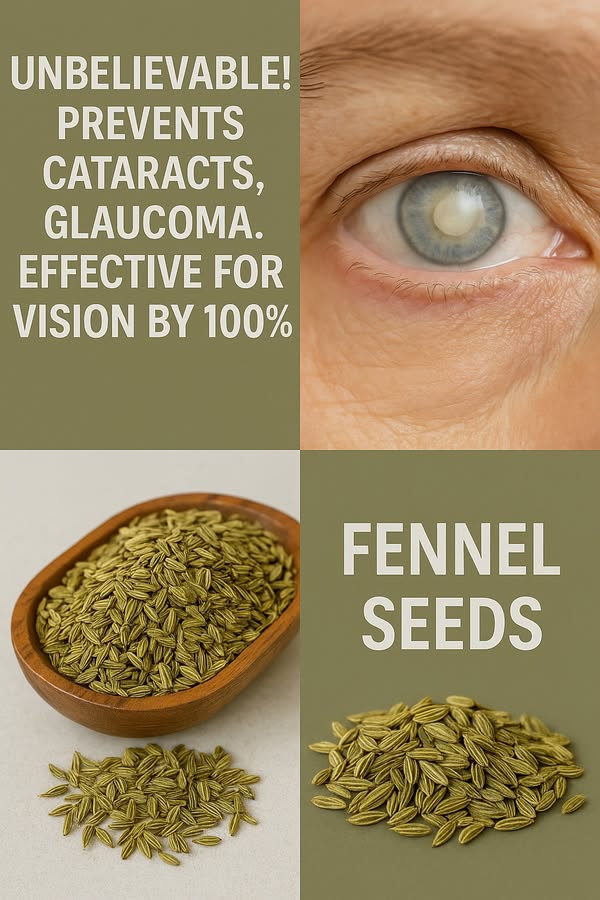
Fennel, known for its sweet, licorice-like flavor, has been a staple in traditional medicine for centuries. While it’s often praised for improving digestion, hormonal balance, and respiratory health, there’s one lesser-known but powerful benefit worth exploring—its impact on vision. Fennel tea, made from the seeds of the Foeniculum vulgare plant, offers remarkable properties that may support eye health and help prevent conditions like cataracts and glaucoma. For those seeking a natural approach to vision care, especially in a world filled with screens and environmental toxins, fennel tea could be a gentle yet effective ally.
Barbara O’Neill, a well-known health educator and natural lifestyle advocate, often reminds us that healing begins with nourishment. According to her teachings, protecting the eyes doesn’t start at the optometrist’s office, but rather with what we eat, drink, and how we care for our overall health. Fennel, in her view, is one of those plants that bridges the gap between food and medicine, providing potent benefits in a simple cup of tea.
This in-depth guide explores how fennel tea supports vision health, the science behind its benefits, how to prepare it properly, and how it can naturally aid in preventing or easing conditions like cataracts and glaucoma.
Understanding the Basics: How Vision Declines with Age
Before diving into fennel tea’s benefits, it’s helpful to understand what happens to our eyes over time. As we age, oxidative stress increases, damaging the delicate structures of the eyes. The lens becomes less flexible, the fluid balance in the eye may shift, and nutrient absorption declines. All of these factors contribute to common age-related eye issues:
- Cataracts – Clouding of the lens caused by oxidative damage and protein buildup. Vision becomes blurry or dim, and glare from lights can be problematic.
- Glaucoma – Often called the “silent thief of sight,” glaucoma results from increased pressure in the eye, which damages the optic nerve. It can go unnoticed for years until vision loss becomes apparent.
- Macular degeneration – A progressive condition affecting the central part of the retina, making it difficult to read or recognize faces.
These conditions are closely linked to inflammation, nutrient deficiency, and poor circulation. That’s where fennel tea may come in as a valuable preventive and supportive remedy.
Why Fennel Tea?
Fennel seeds are packed with nutrients and antioxidants that directly benefit eye health. Some of the key compounds in fennel include:
- Vitamin C – Supports the immune system and acts as a powerful antioxidant.
- Flavonoids – Including quercetin and kaempferol, known to reduce inflammation and protect the eyes from oxidative damage.
- Anethole – A compound with anti-inflammatory and antimicrobial properties.
- Potassium and magnesium – Help regulate fluid balance in the body and support healthy nerve function.
These nutrients make fennel tea not just soothing to the digestive system, but deeply nourishing to the eyes and nervous system.
1. Fennel Tea and Cataracts: Prevention Through Antioxidants
Oxidative stress plays a major role in the development of cataracts. As free radicals accumulate in the eye, they damage the proteins in the lens, leading to cloudiness and vision impairment. Antioxidants can help combat this process by neutralizing these harmful molecules.
Fennel tea is rich in natural antioxidants that can slow this degenerative process. Drinking it regularly provides your body with plant-based protection against cellular aging, especially in the sensitive tissues of the eye.
How it helps:
- The flavonoids in fennel reduce protein damage in the lens.
- Vitamin C supports collagen health and may delay lens clouding.
- Anethole’s anti-inflammatory action helps prevent irritation in the eye, which can contribute to cataract formation.
In one traditional remedy, fennel seed water was used as an eye rinse to help with early-stage cataracts, though this should only be done under proper guidance to ensure safety and sterility.
2. Fennel Tea and Glaucoma: Supporting Fluid Balance and Eye Pressure
Glaucoma often develops silently. It’s primarily caused by increased intraocular pressure, which can damage the optic nerve over time. Managing pressure within the eye and improving fluid outflow is key to preventing this condition from progressing.
Fennel has mild diuretic properties, meaning it helps the body eliminate excess fluid, including from the eyes. At the same time, its anti-inflammatory compounds may support better blood flow and nerve health, reducing the risk of optic nerve damage.
How it helps:
- Improves circulation to the eye, allowing better nutrient delivery.
- Supports healthy fluid drainage and pressure regulation.
- Acts as a calming tea that may help reduce cortisol, which plays a role in pressure fluctuations.
Barbara O’Neill emphasizes the importance of natural blood flow, oxygenation, and hydration in maintaining eye health, particularly in conditions like glaucoma. Fennel tea fits naturally into her holistic approach.
3. Eye Brightening and Vision Clarity with Fennel
In folk medicine, fennel was known as the “eye herb” and was commonly used in eyewashes and compresses. Drinking fennel tea may not only protect long-term vision but also bring noticeable improvements in clarity and brightness of vision.
People who suffer from dry eyes or tired eyes due to extended screen time may benefit from fennel’s soothing, anti-inflammatory effects.
Reported benefits from regular use:
- Reduced eye fatigue
- Improved night vision
- Clearer focus and reduced dryness
- Brighter whites of the eyes
Of course, results vary, but many who’ve used fennel tea as part of a daily wellness practice report gradual yet noticeable changes in eye comfort and sharpness.
4. Fennel for Blood Sugar and Vision
One of the hidden connections between fennel tea and eye health lies in its ability to support balanced blood sugar. High blood sugar is a risk factor for diabetic retinopathy, a condition that damages the retina and leads to vision loss.
Fennel helps regulate digestion and can have a stabilizing effect on blood glucose levels when used consistently. This indirect benefit is especially important for those with prediabetes or type 2 diabetes, where managing blood sugar is essential for preventing long-term vision complications.
5. How to Make the Perfect Cup of Fennel Tea
To enjoy the full benefits of fennel for vision, it’s important to prepare the tea properly. Here’s a simple recipe that preserves the potency of its oils and nutrients:
Ingredients:
- 1 to 1.5 teaspoons of whole fennel seeds
- 1 cup of boiling water
- Optional: a pinch of turmeric or a few drops of lemon juice for added anti-inflammatory effects
Instructions:
- Crush the fennel seeds slightly to release the oils.
- Pour boiling water over the seeds in a cup or teapot.
- Cover and steep for 10 to 15 minutes.
- Strain and sip slowly, preferably warm.
Drink one to two cups per day, ideally between meals. Consistency is key. As with most herbal remedies, effects build over time rather than appearing overnight.
6. Bonus Use: Fennel as an Eye Compress
For tired, inflamed, or red eyes, fennel tea can be used topically in the form of a compress:
- Brew a strong fennel tea and let it cool.
- Soak a clean cotton cloth or cotton pads in the cooled tea.
- Lie down and place the compress over your closed eyelids for 10–15 minutes.
This can reduce puffiness, eye irritation, and help soothe tired eyes after a long day on the computer or in bright light.
7. Are There Any Side Effects?
Fennel tea is generally safe for most people when consumed in moderate amounts. However, it’s always wise to check for any allergies, especially if you have sensitivities to plants in the carrot or parsley family. Those who are pregnant or on blood-thinning medications should consult with a healthcare provider before using fennel regularly.
Final Thoughts: Eye Health the Natural Way
Good vision is something many people take for granted until it begins to deteriorate. While conventional treatments have their place, nature offers powerful allies that can help us protect our eyesight well into old age. Fennel tea, with its long history and well-documented benefits, is a simple yet potent way to nourish the eyes from within.
Barbara O’Neill often teaches that the best medicine comes from the earth—foods and herbs that work with our bodies, not against them. Fennel fits this philosophy perfectly. It’s affordable, easy to find, and carries no risk of harmful side effects when used wisely.
By making fennel tea a daily ritual, you’re not just enjoying a pleasant drink—you’re actively participating in your own long-term eye health. From preventing cataracts to supporting healthy eye pressure and clarity, this humble seed offers more than meets the eye.
So go ahead—brew a warm cup, sit back, and give your eyes the support they deserve.


